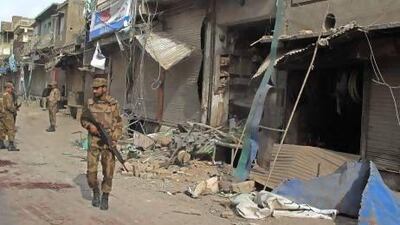RAWALPINDI, PAKISTAN // A bombing claimed by the Taliban killed at least six people and wounded 90 others at a Shiite religious procession in north-west Pakistan yesterday, police said, as the minority Muslim sect observed the annual Ashura holiday.
The explosion went off as hundreds of Shiites were passing through the main intersection of the city of Dera Ismail Khan, police said, where food and water stalls were set up to serve the crowd.
An initial investigation suggested a bomb was planted near a shop along the procession route, but a Taliban spokesman, Ahsansullah Ahsan, said the blast was triggered by a suicide number.
The town is considered a gateway to South Waziristan, once a major sanctuary for Al Qaeda and the Taliban on the Afghan border where Pakistan military launched a major offensive in 2009.
A similar bombing killed seven and injured 30 in Dera Ismail Khan on Saturday.
Since Wednesday, at least 31 have been killed in bombings aimed at Pakistani Shiites and claimed by the Taliban.
More than 100 were wounded in the attacks during days before the holiday, which commemorates the 7th-century death of the Prophet Mohammed's grandson.The schism between Sunnis and Shiites dates back to that time.
Several of injured were in serious condition, said Dr Faridullah Mahsud, an official at the city's hospital, who added that three members of a paramilitary unit providing security for the procession were among the injured
In Karachi, the country's biggest city, police yesterday said they had seized a lorry laden with 300 kilograms of explosives after a clash in which one suspected militant was killed.
"It is one of the biggest confiscations of explosives in the city," Chaudhry Aslam, a senior city police official, said.
In the central Punjab province, police said a would-be suicide bomber was arrested in the town of Vehari.
"The bomb contained about eight kilograms of explosives and steel balls, and was detonated with a remote-control device," the city police chief, Sohail Khalid, said.
The Pakistani Taliban frequently attack Shiites, who they consider heretics.
Ashoura ceremonies are a prime targets, because they draw large crowds that march in processions to mourn the martyred Imam Hussein.
Earlier in the day, participants in the procession in Dera Ismail Khan beat their chests in grief over Hussein's killing, while later some cut themselves to express their sorrow in blood.
Qais Abbas, a Shiite, said that one of his relatives was in critical condition, but that he and others were moving the wounded to other hospitals that were better equipped.
"Here we are not getting proper care for them. There are not enough doctors or medicines," he said.
After the blast, thousands of Shiite mourners staged a sit-in at a nearby intersection, refusing to move unless assured quick and stern action against the perpetrators. The procession has now been attacked for a second consecutive day.
Authorities had suspended mobile phone networks in more than 50 cities and towns yesterday and on Saturday to avert possible attacks by the militants.
Motorcycle riding was also banned in most of the country after authorities received intelligence that militants could target Ashura processions in drive-by shootings.
Officials said that they also had information that militants could detonate bombs by using mobile phones.
"The banning of cell phones and motorcycle riding have produced good results … we have been able to thwart many attacks," said Qaim Ali Shah, chief minister of Sindh province, of which Karachi is the capital.
Tens of thousands of police and paramilitary troops were deployed along processions' routes.
Close circuit cameras were also installed along the routes in Karachi and Lahore while helicopters were also used in several cities for the aerial surveillance of the processions.
Roads leading to imam bargahs - Shiite community centres - were blocked with barbed wires and walk-through gates were installed where people were thoroughly checked before they were allowed to join processions.
"We have become used to these attacks. These are not new things for us," Akmal Hussain, a mourner attired in black dress, said in the city of Rawalpindi as he was going through security checks along with his seven-year-old son.
"Government takes security measures every day but has failed to stop terrorists."
Meanwhile, millions of Shiites flooded the Iraqi shrine city of Karbala yesterday for the peak of Ashura rituals, which have been largely spared the deadly attacks that struck pilgrims in past years.
This is the third year since the 2003 United States-led invasion that Iraqi security forces have been in sole charge of security during Ashura.

